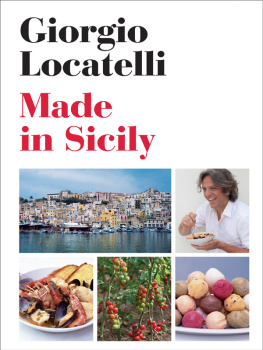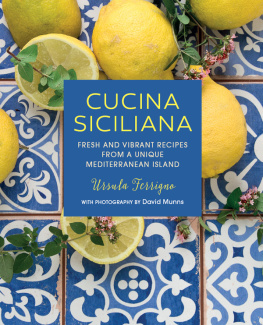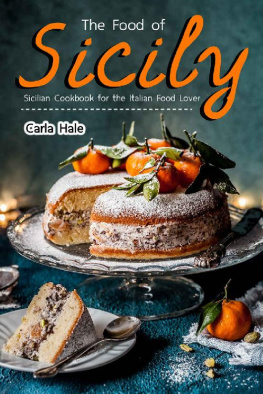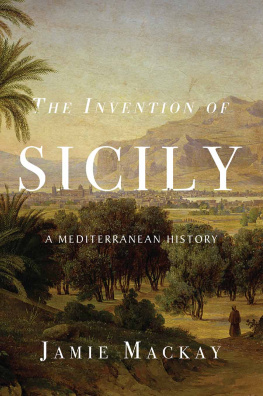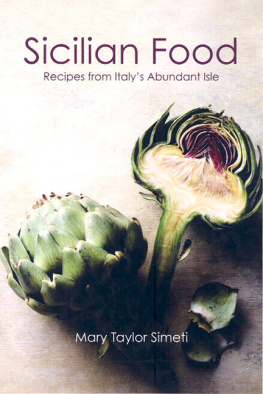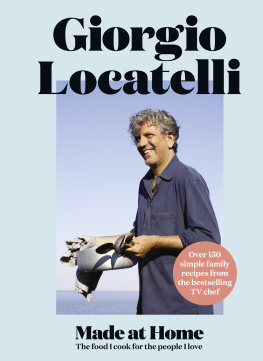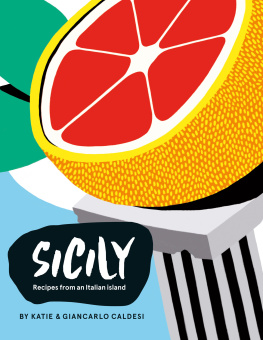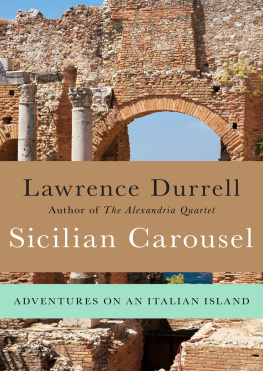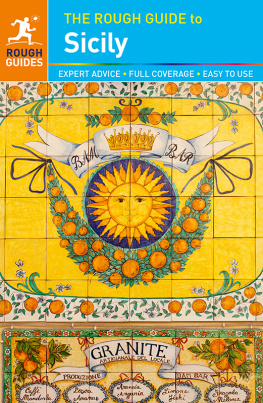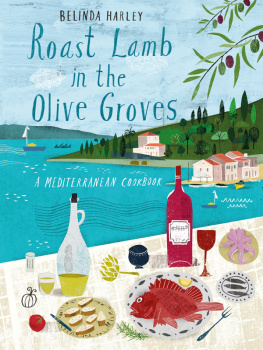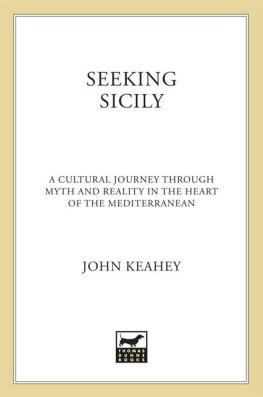
Sicily is Sicily1860, earlier, forever.
Giuseppe Tomasi di Lampedusa
As a northern Italian, I grew up with preconceived ideas about Sicily and southern Italy. The joke was always that no one in the south did any work; it was the northern Italians who ran the country and made things happen. I grew up in Corgeno, on the shores of Lake Comabbio in Lombardy, where our family had a hotel and restaurant, La Cinzianella, and like most people in the village we went on vacation to Emilia Romagna, or maybe Liguria. It was only in the seventies that people really started to go south.
So you cannot overestimate how exciting it was that when I was about twelve years old, four friends, whom I looked up to because they were oldermaybe eighteenwent off to Calabria, and from there to Sicily because one of them fell in love with a Sicilian girl (he actually ended up marrying her). Corgeno is a small place, where everybody knows everything about everyone else, and in those days when someone came back from their vacations they would be in the village square telling stories about the time they had had.
When these guys returned, they were full of talk about the fantastic life, the sun, the beautiful seathey made Sicily sound like a Robinson Crusoe island, full of beaches with no one on them. In my mind it became an idyllic, almost mythological place that sounded like the Caribbean, populated by people who were Italians, yet not like Italians; almost a different race. They spoke a language that was completely different from ours, and the whole island seemed to work in such a different way than northern Italy.
It was twenty years before I finally got to go to Sicily for the first time. Life got in the way: the army, cooking in Paris and London, having a familymy wife Plaxy, son Jack, and daughter Margherita (Dita)setting up our first restaurant, Zafferano, and then later Locanda Locatelli. Then, in the late nineties, the winemaker Alessio Planeta (pictured on the previous page) invited me to look at an olive oil project he was beginning at La Capparrina in Menfi, in the southwest of the island. What was interesting was that after cooking for more than two decades in London, I found myself looking at the island as much through the eyes of a Londoner as those of a northern Italian. Even after countless vacations in Menfi, where I have got to know many of the local people, there are times when I still feel as foreign as Plaxy, because when the local farmers or fishermen talk in dialect I cant really understand what is being said!
On that first visit it was early spring, just before Easter, when I arrived in Palermo, and as we drove down to Menfi I was completely blown away by the fact that the island looked so green and bright and gorgeous. I had expected something like northern Africa, and it is true that some areas are like that, but even in the middle of the motorway there were masses of big red bougainvillea, and the road cut through beautiful wheat fields and orange and lemon groves, olive groves, vineyards and fields of artichokes. The whole island was like a garden, and in a way the structure, with its funny old walls, reminded me a little of the English countryside.
I could see right away that the northern Italian idea that the guys who lived in Sicily sat around doing nothing was completely wrong. Everywhere you saw the hand of man, the agriculturist, over nature, in fields and groves that had been worked and tended for thousands of years.

What grows together, goes together
Every time I go to Sicily, what blows me away is not only the incredible intensity of flavor that is in everything you eat, from the pale greeny-gold broccoli that punches you in the face with its taste, to the tomatoes from Pachino, which are so exquisitely sweet they almost make you want to cry, to the lemons growing everywhere, so beautiful you can just slice them and eat them with salt and olive oil. No, it is not only that. It is the absolute belief that the Sicilians have in the ascendancy of the ingredients over any kind of overcreativity or pretentiousness. Whenever I have eaten in peoples houses or in restaurants, what I see is not the personality of the cook or the chef coming out in the dishes, but the personality of the land and the sea.
The first wave of people to invade Sicily, the Greeks, went there because of the abundance of the territory. In the Odyssey , Homer talks about the land of the one-eyed giants, the Cyclops, at the foot of Mount Etna, which, despite the fact that the Cyclops did nothing to tend the land, was so rich with produce that it amazed the hero, Odysseus, when he landed on the island. Obviously the Cyclops never existed, but I sometimes think that Homer invented the idea of them because he had found such a beautiful place he didnt want anyone else to share it: Dont go there; there are one-eyed giants! Because the orchards, gardens and groves of olives, luscious figs, the vines fruit, and the vegetables of all the kinds that flourish in every season were very real, and they have remained, immovable, at the heart of Sicilian cooking no matter who has invaded or ruled over the island.
When people talk about Sicilian cooking, they always say, This is what the Greeks left, or This is what the Arabs or the Spanish brought, because Sicilys history is a complex one of two and a half thousand years of invasion and domination by foreign powers who treated the island as a colony, and often plundered their produce to feed their homelands. After the Greeks came the Romans, the Arabs, the Normans and the Spanish, and when Napoleon invaded Naples in 1798, King Ferdinand and his court took refuge in Sicily, bringing over chefs from Paris who cooked the fashionable French food of the times and were known as the monzu , a version of monsieur . Finally, in 1860, Garibaldi, helped by the English, landed at Marsala with his band of red shirts to begin his conquest of Sicily and the unification of Italy.
Historians talk about the sophisticated, baroque, baronial cooking of the Sicilian nobility on the one hand, and on the other, cucina povera , the cooking of the poor people who were forced to be clever with whatever ingredients they had. And we cannot forget the Mafia, which has historically controlled food prices, production and businesses. Of course, all this social history left some sort of mark, but I believe that the biggest influence on Sicilian food, and the winning force over everything, is the territory: the land and the sea. These determine the produce, which has stayed constant and strong throughout all the cultural changes, hardships, bloodshed and extortion.
Even if the Arabs introduced oranges and lemons, sugar and spices all those centuries ago, it is the territory that ultimately decides what grows. We are talking about food from a very special, particular land, especially the volcanic area around Mount Etna (where the mythological Cyclops lived), all the way down the plain of Catania to Pachino, where they produce the tomatoes that taste like no others, and the arid groves that produce the most beautiful olives and grapes. And then there is the profusion of fish and shellfish that throughout most of Sicily are prized above meat. Especially swordfish and tuna, which were once abundant around the Strait of Messina but are now sadly overfished, and the beautiful red prawns that come from the cold waters off Mazara del Vallo.

